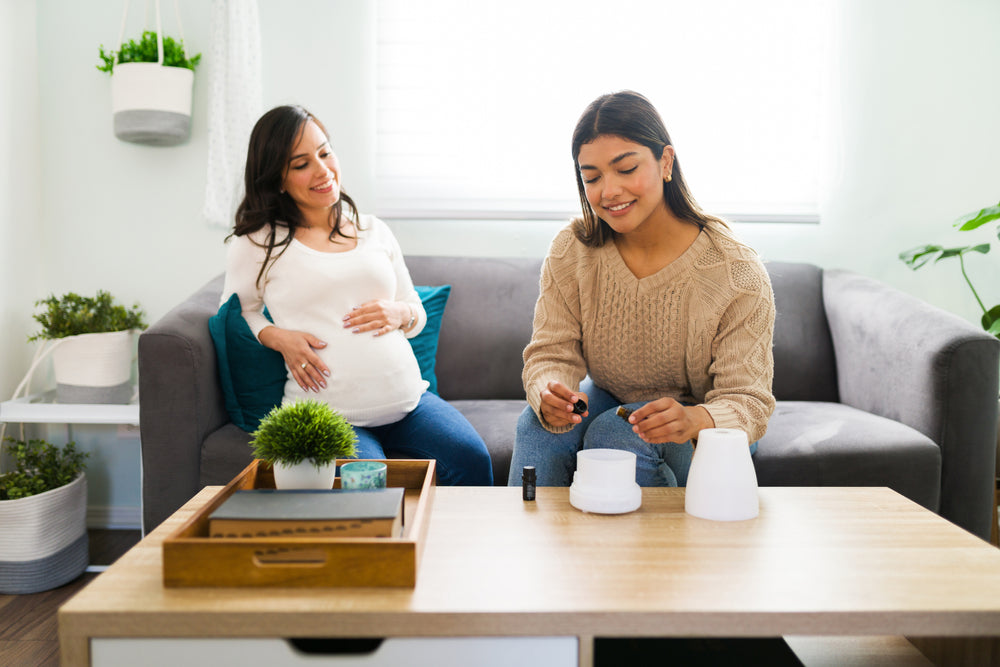For many, pregnancy is a time to explore more holistic approaches to health and well-being, such as essential oils. However, while their scents can be soothing and their natural origin appealing, it's important to use them wisely during pregnancy.
Is it Safe to Use Essential Oils While Pregnant?
Essential oils contain concentrated plant extracts that give them their benefits and aromatic appeal. They are commonly used in aromatherapy to stimulate the body to provide health benefits, as well as in perfumes, soaps and other cosmetics. Sometimes, these plant extracts can be harmful to expecting mothers, stimulating uterine contractions or affecting fetal development making it crucial to know which essential oils are safe for pregnant women as well as those to avoid. Every source is in agreement that you should make sure any essential oil you purchase is a quality one. A high quality, 100% essential oil, like ours at Avivni, should clearly list one ingredient on the bottle-- the scientific name of the plant from which the oil was extracted.
Essential Oils SAFE For Pregnant Women
Thankfully, there are many essential oils that are considered safe by scientists and physicians for use during pregnancy. Because every pregancy is unique, however, we always recommend discussing your choice to use essential oils with your holistic physician. The Essential Oils on this list can be used to alleviate common discomforts such as morning sickness, hemorrhoids, backache, and anxiety.
- Cardamom
- Chamomile (German and Roman)
- Cypress
- Frankincense
- Geranium
- Ginger
- Lavender
- Lemon
- Myrtle
- Neroli
- Patchouli
- Peppermint (inhalation)
- Petitgrain
- Pomegranate
- Rose
- Rosewood
- Sandalwood
- Tea Tree
- Wild Orange
- Ylang Ylang
Essential Oils to AVOID While Pregnant
Some Essential Oils contain organic plant compounds that can cross the barrier of the placenta to affect the development of a developing fetus. Other may trigger menstruation or stimulate muscle contractions (such as in the uterus). Keep in mind this is not an all-inclusive list of essential oils that may not be safe for use during pregnancy.
- Aniseed
- Basil
- Birch
- Camphor
- Carraway
- Cinnamon
- Clary Sage
- Fennel
- Hyssop
- Marjoram
- Mugwort
- Oak Moss
- Parsley (Seed and Leaf)
- Pennyroyal
- Peppermint (ingesting)
- Rosemary
- Rue
- Sage
- Tansy
- Tarragon
- Thuja
- Thyme
- Wintergreen
- Wormwood
Diffusing Essential Oils While Pregnant
Generally, the safest method of essential oil use while pregnant is diffusion or inhalation. You can drop a few drops of any of the "safe" oils into your electronic diffuser, however, it is recommended to limit the usage time of your diffuser to 15-20 minutes to prevent any overstimulation or nausea. Other technique for inhalation is to add several drops to your bath water.
Essential Oils for Infections While Pregnant (Sinus, Yeast, Etc)
Some Essential Oils deemed safe for use during prenancy are believed to combat infection. For instance, sinus infection essential oils you can use while pregnant include tea tree, peppermint, ginger and lemon. However, you should NOT use camphor or wintergreen.
Can I Ingest Essential Oils While Pregnant?
Ingesting essential oils is a tricky subject, even for non-pregnant people and animals. Although the "safe" list above might contain some essential oils known to be ingestible, we highly recommend to consult your doctor or holistic practitioner to make sure it is ok to ingest any essential oils while pregnant.
How to Topically Apply Essential Oils While Prenant
Remember, pregnant ladies, ALWAYS dilute your essential oils into a carrier oil, lotion, soap base, etc. If you have cleared an essential oil as one of the ones safe for use during pregnancy, you can the appropriate amount to your favorite lotion, soap or carrier oil. The standard dilution is 1-2% so, for instance, if you have a once ounce bottle of a carrier oil, like argan or castor oil, you can add anywhere from 3-12 drops. Sensitivity is at an all time high during pregnancy, so it's important not to exceeed the standard dilution.
And Finally, What are the Best Essential Oils for Pregnant Women?
Due to the uniqueness of creating a new life, the "best" essential oil for pregnancy will be highly dependent upon your changing body chemistry. Generally, there are a few tried and true standouts:
- Frankincense essential oil is an excellent choice for soothing the aches and pains of pregnant bodies.
- Lemon and Ginger essential oils are the winners for combating nausea.
- Lavender essential oil during pregnancy can help relieve "pregnancy belly" (irritated, stretching skin)
- Tea Tree essential oil is great for soothing hemorrhoids.
- Ylang Ylang essential oil can help promote more restful sleep.
In conclusion, essential oils can be a beneficial part of a holistic pregnancy journey. With appropriate caution, careful selection, and professional guidance, they can provide natural relief from many pregnancy-related discomforts. Their soothing scents and therapeutic properties can create a nurturing environment, promoting both physical and emotional well-being for expecting mothers.

